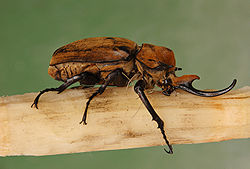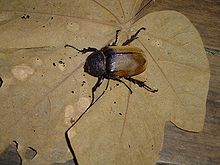- Elephant beetle
-
Elephant beetle 
Scientific classification Kingdom: Animalia Phylum: Arthropoda Class: Insecta Order: Coleoptera Family: Scarabaeidae Subfamily: Dynastinae Genus: Megasoma Species: M. elephas Binomial name Megasoma elephas Subspecies M. e. elephas
M. e. occidentalisElephant Beetles, Megasoma elephas, are part of the Scarabaeidae family and the subfamily Dynastinae. They are classified with the Neotropical rhinoceros beetles.
Contents
Appearance
Elephant beetles are black in color and covered with a coat of fine microscopic hairs. The hairs grow particularly thick on the beetle's elytra. The hairs give the beetle's body a yellowish color. Males have two horns protruding from the head and another from the prothorax. Females have no horns. The horns are used for defense in competition among males for food and mates.
Size
In size, Elephant Beetles range between 7–12 cm (2.75-4.75 in); males are sometimes even bigger. Males are around 2 to 3 times bigger than the females.
Location
Elephant Beetles are located in southern Texas, southern Mexico, Central America, in South American rainforests, and in parts of Australia.
List of subspecies
- Megasoma elephas elephas Fabricius, 1775
- Megasoma elephas iijimai Nagai, 2003
- Megasoma elephas occidentalis Bolívar et al., 1963
Breeding
Elephant Beetle larvae develop in large decaying logs and take up to three years to develop into adult beetles, depending upon the subspecies. The female Elephant Beetle lays her eggs inside the decaying log or in the ground. Some weeks after that (usually 3) the eggs hatch into C-shaped larvae, white grubs with brown heads and six legs. The larval stage lasts around 29 weeks, during which time the grubs consume organic matter. The third and last stage, the pupal stage, lasts around 5 weeks at a temperature of 26 degrees Celsius. The life span of an adult Elephant Beetle is around one to three months.
Food
For their diet, Elephant Beetles eat the sap of particular trees and ripened fallen fruits such as pineapples. They also eat longan, lychee fruit, and bark from certain trees like the poinciana.
Behavior and habitat
Elephant Beetles live in rainforests and are mainly active during the night. They are able to maintain high body temperatures with temperature decrease.[1]
Elephant Beetle population has been depleted by the destruction of the rainforests, which has reduced their grounds for mating.
Potential Military Use
As part of a Pentagon-sponsored project, researchers at the University of California, Berkeley have implanted electrodes into elephant beetle pupa. This allows some remote control of the adults flying behaviour.[2]
References
- ^ Temperature Regulation, Energy Metabolism and Mate-Searching in Rain Beetles
- ^ "Remote controlled bugs buzz off". BBC News. 2009-10-13. http://news.bbc.co.uk/1/hi/technology/8302903.stm. Retrieved 2009-10-14.
External links
Categories:
Wikimedia Foundation. 2010.

